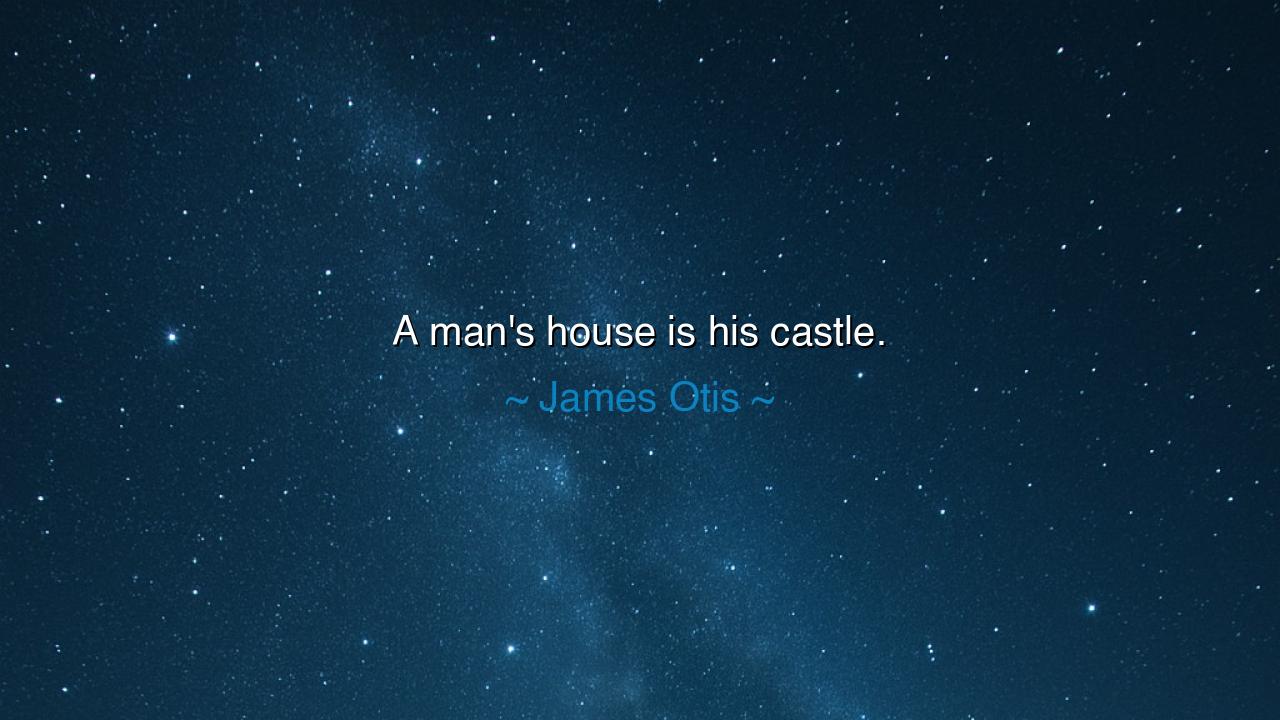
A man's house is his castle.






“A man’s house is his castle.” Thus declared James Otis, the fiery orator of the American Revolution, whose words ignited the spirit of liberty long before the first musket fired at Lexington. In this simple yet thunderous phrase, Otis proclaimed a truth older than empires and holier than kings: that within the walls of one’s home, every man is sovereign, every woman free. No crown, no army, no lawless authority has the right to trespass upon the sanctity of that space. For the home is not merely a dwelling of wood and stone—it is the fortress of dignity, the sanctuary of peace, the small kingdom where freedom first begins.
The origin of this quote reaches back to the great struggles between monarchs and their people. In the England of the seventeenth century, the rights of the individual were often crushed beneath the weight of royal decree. Yet even then, jurists like Sir Edward Coke had spoken words that would echo through the ages: “The house of every man is to him as his castle and fortress.” It was James Otis, however, who took this ancient principle and breathed into it the fire of revolution. Standing in the courts of colonial Massachusetts, he denounced the Writs of Assistance—the king’s lawless search orders that allowed British officers to invade homes without cause. Otis declared that such violations struck at the heart of liberty itself. “A man’s house is his castle,” he thundered, and with that cry, he laid one of the first stones in the foundation of American freedom.
To Otis, the home was sacred because it was the first realm where man learned what it meant to be free. Within its walls, the individual is ruler—not by conquest or wealth, but by the natural right bestowed upon every soul. The home is where a man’s labor finds rest, where his family is safe from intrusion, where his thoughts and prayers belong to him alone. In defending the sanctity of the home, Otis defended the very idea of personal sovereignty—the truth that each human being has a domain of selfhood that no power may rightfully invade.
Consider the courage of Otis himself, who risked his life and reputation to speak against the British Crown. His stand was not for himself alone, but for the common people, for every humble farmer and tradesman whose hearth might one day be trampled by soldiers’ boots. Though he later fell into silence and sorrow, his words lived on, burning in the hearts of the revolutionaries who followed him. John Adams, who heard Otis’s speech as a young man, would later write that “then and there, the child Independence was born.” Thus, from the defense of the smallest home grew the birth of a nation.
Yet this quote is not only a cry of defiance—it is also a hymn to responsibility. For if one’s house is a castle, one must rule it wisely. The home must not become a fortress of greed or tyranny, but a haven of justice, mercy, and peace. Freedom is not license; it is stewardship. The ruler of a home must protect those within it—not only from intrusion without, but from cruelty within. Every parent, every guardian, every leader of a household holds the same sacred duty as a king: to ensure that all who dwell under their roof may live with safety, respect, and love.
In this, the wisdom of Otis reaches beyond politics and into the realm of the soul. For the castle is not only the house we build upon the earth—it is also the inner dwelling of the heart. Each man, each woman, must guard this inner home from the intrusions of corruption, fear, and falsehood. Just as we would not let an enemy cross the threshold of our dwelling, so too must we bar the doors of our spirit against despair and dishonor. The home within must remain inviolate, the sanctuary of truth where conscience reigns.
The lesson, then, is this: cherish and defend your home—not with violence, but with virtue. Let your house be a place where peace resides, where love is law, and where integrity is the shield that guards the gate. Honor the privacy of others as you would have yours honored. In a world where intrusion grows ever easier and the sacredness of home is often forgotten, remember that your dwelling—be it a palace or a hut—is your castle, the seat of your freedom and the mirror of your soul.
So, O listener, heed the wisdom of James Otis: the defense of the home is the defense of liberty itself. Keep your threshold sacred. Guard it with justice, fill it with compassion, and let no force—whether tyranny or temptation—diminish the sovereignty of your spirit. For in protecting the small fortress of your own home, you uphold the great fortress of humanity’s freedom.






AAdministratorAdministrator
Welcome, honored guests. Please leave a comment, we will respond soon